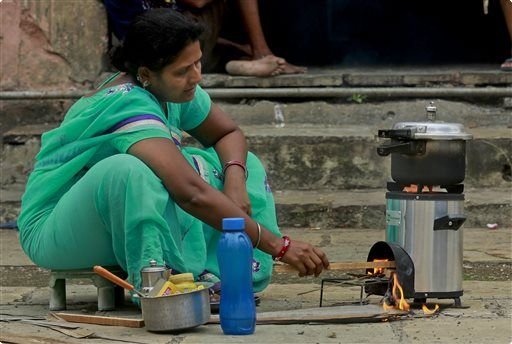India prioritizes 'clean kitchen' to combat climate change
Gathering dry cow dung to make the clay stove red, Kamlesh was forced to inhale the billowing smoke, bitter eyes, sore throat and itch as she and hundreds of millions of housewives in India I have to go through cooking. Continuous exposure to smoke from indoor smoke is the cause of death for 4.3 million people worldwide every year and especially of which 30% are Indians. In addition, kitchen smoke including carbon black is one of the leading factors leading to environmental pollution.
Therefore, for decades, the Indian government has made efforts to propagate and encourage people to use "clean cookers" such as biomass gas cookers, electric stoves, oil stoves . but recently reaped very modest results. Neha Juneja, director of an eco-friendly home appliances company, said: "A typical modern family in India will have a TV, some mobile phones . but their kitchen is still stay the same as 50 years ago ".
India lists "clean cookers" as part of a national action to combat climate change and has submitted this to the 21th United Nations Conference on Climate Change (COP21). In fact, the clean kitchen program has been active in India since the 50s of the last century, but in the 1980s there were still about 700 million people burning wood and cow dung for cooking.

A woman instructs to cook biomass gas in Mumbai.(Photo: AP).
While many experts judge that the conversion of cooking stoves cannot make a significant breakthrough in the environment, India asserts that it is a strategic step to save lives and ensure the energy balance for the poor. To show determination, Indian Energy Minister Piyush Goyal said the agency prioritizes to support those " who have rejected clean energy for many years" , knowing that nearly 2 million Indians have declined. suggest replacing this stove.
Middle-aged poor women like Kamlesh are still skeptical. She, like many other people in Ganora Sheikh, a village in northern India, only 80 kilometers from New Delhi, does not care much about climate change or thawing somewhere far away. They just wonder why it is necessary to spend $ 30 to $ 60 for a stove while you can fire wood in the forest for free.
In addition, the most popular type of bread in northern India is roti and naan, which often do not have the characteristic smoky flavor if processed in an oil stove or gas stove. Kamlesh lamented: "If we can't cook roti, what will we eat? Nothing can replace roti".
In addition, the benefits of anti-climate change when changing kitchens cannot reach absolute perfection because gas cookers also produce methane, a gas that causes a greenhouse effect and electric stoves can become "criminals" because in India most of the electricity is produced from coal power plants.
But the Indian government's efforts on the "clean kitchen" also brought a positive effect like Rekha Devi, a housewife at Ganora Sheikh, who was extremely happy with the new stove. So far she only takes half the time compared to before to cook dinner. She can also turn the kitchen into the house when it rains. The wall was no longer haunted by the soot and the smoke-free kitchen as before. The 40-year-old woman affirmed: "Everything is better."
This problem is not limited to the extent in India but countries like China and Ethiopia are also promoting the "clean kitchen" program. In Nigeria, where deforestation has become a problem, in 2014 the government said it would provide 750,000 stoves to prevent over-exploitation of timber.
- America wants India to address climate change
- Denmark prioritizes to help Vietnam cope with climate change
- America helps Vietnam fight climate change
- Handshakes of billionaires to rescue humankind from 2017
- Planting seaweed into a forest under the ocean can combat climate change
- Nuclear power is more dangerous because of climate change
- MARD acts to respond to climate change
- France helps Vietnam respond to climate change
- Connecting against climate change
- This is how Dubai copes with climate change
- Damage of 40 billion USD / year due to climate change
- Strategy to reduce greenhouse effect
 Is the magnetic North Pole shift dangerous to humanity?
Is the magnetic North Pole shift dangerous to humanity? Washington legalizes the recycling of human bodies into fertilizer
Washington legalizes the recycling of human bodies into fertilizer Lightning stone - the mysterious guest
Lightning stone - the mysterious guest Stunned by the mysterious sunset, strange appearance
Stunned by the mysterious sunset, strange appearance